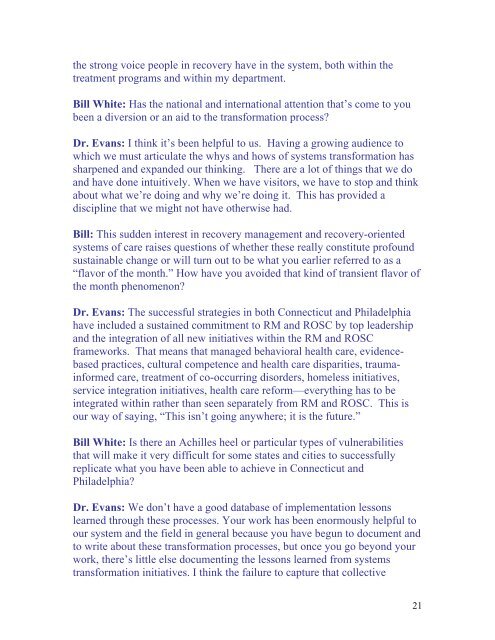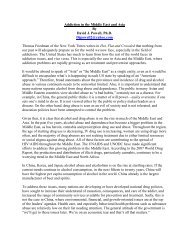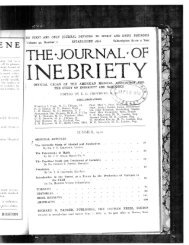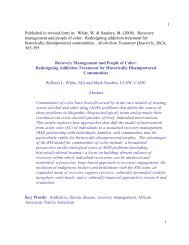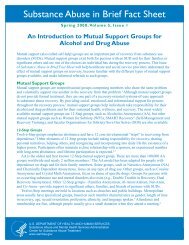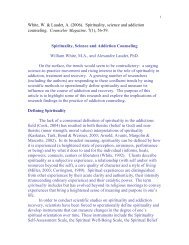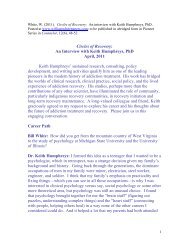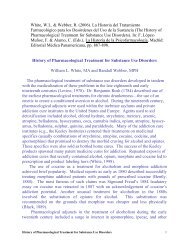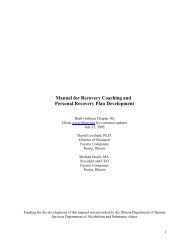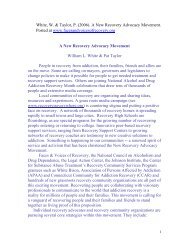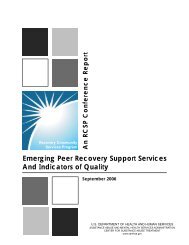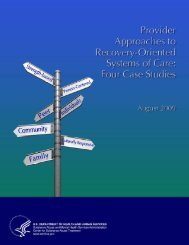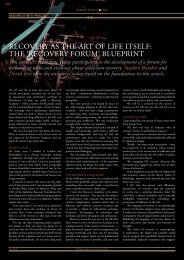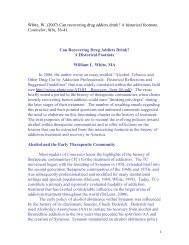An Interview with Arthur C. Evans, Jr., PhD Dr. Arthu - William L. White
An Interview with Arthur C. Evans, Jr., PhD Dr. Arthu - William L. White
An Interview with Arthur C. Evans, Jr., PhD Dr. Arthu - William L. White
- No tags were found...
Create successful ePaper yourself
Turn your PDF publications into a flip-book with our unique Google optimized e-Paper software.
the strong voice people in recovery have in the system, both <strong>with</strong>in thetreatment programs and <strong>with</strong>in my department.Bill <strong>White</strong>: Has the national and international attention that’s come to youbeen a diversion or an aid to the transformation process?<strong>Dr</strong>. <strong>Evans</strong>: I think it’s been helpful to us. Having a growing audience towhich we must articulate the whys and hows of systems transformation hassharpened and expanded our thinking. There are a lot of things that we doand have done intuitively. When we have visitors, we have to stop and thinkabout what we’re doing and why we’re doing it. This has provided adiscipline that we might not have otherwise had.Bill: This sudden interest in recovery management and recovery-orientedsystems of care raises questions of whether these really constitute profoundsustainable change or will turn out to be what you earlier referred to as a“flavor of the month.” How have you avoided that kind of transient flavor ofthe month phenomenon?<strong>Dr</strong>. <strong>Evans</strong>: The successful strategies in both Connecticut and Philadelphiahave included a sustained commitment to RM and ROSC by top leadershipand the integration of all new initiatives <strong>with</strong>in the RM and ROSCframeworks. That means that managed behavioral health care, evidencebasedpractices, cultural competence and health care disparities, traumainformedcare, treatment of co-occurring disorders, homeless initiatives,service integration initiatives, health care reform—everything has to beintegrated <strong>with</strong>in rather than seen separately from RM and ROSC. This isour way of saying, “This isn’t going anywhere; it is the future.”Bill <strong>White</strong>: Is there an Achilles heel or particular types of vulnerabilitiesthat will make it very difficult for some states and cities to successfullyreplicate what you have been able to achieve in Connecticut andPhiladelphia?<strong>Dr</strong>. <strong>Evans</strong>: We don’t have a good database of implementation lessonslearned through these processes. Your work has been enormously helpful toour system and the field in general because you have begun to document andto write about these transformation processes, but once you go beyond yourwork, there’s little else documenting the lessons learned from systemstransformation initiatives. I think the failure to capture that collective21


